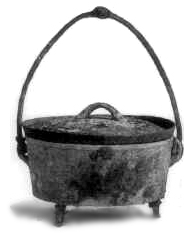Cast-iron cookware
Cast Iron Cookware[edit | edit source]
Cast iron cookware is a type of cookware made from cast iron. It is renowned for its excellent heat retention, durability, and ability to withstand high temperatures. Cast iron cookware includes a variety of items such as skillets, Dutch ovens, griddles, and bakeware.
History[edit | edit source]
The use of cast iron for cooking dates back to ancient China, where it was used for making woks and other cooking vessels. In Europe, cast iron cookware became popular in the 17th century, with the development of the blast furnace allowing for the mass production of cast iron goods. By the 18th century, cast iron cookware was a staple in many households.
Properties[edit | edit source]
Cast iron is known for its ability to retain heat, which makes it ideal for cooking methods that require consistent temperatures, such as frying, searing, and baking. The material is also highly durable and can last for generations if properly maintained. Cast iron cookware can be used on a variety of heat sources, including gas stoves, electric stoves, and even open fires.
Seasoning[edit | edit source]
One of the unique aspects of cast iron cookware is the need for seasoning. Seasoning involves applying a thin layer of oil to the surface of the cookware and heating it to create a natural, non-stick coating. This process not only prevents food from sticking but also protects the cookware from rust.
Types of Cast Iron Cookware[edit | edit source]
Skillets[edit | edit source]
Skillets, or frying pans, are one of the most common types of cast iron cookware. They are versatile and can be used for a wide range of cooking techniques, from frying to baking.
Dutch Ovens[edit | edit source]
Dutch ovens are heavy pots with tight-fitting lids, ideal for slow-cooking, braising, and baking. They are often used for making stews, soups, and casseroles.
Griddles[edit | edit source]
Griddles are flat cooking surfaces that are perfect for making pancakes, crepes, and grilled sandwiches. They provide a large cooking area and are often used for breakfast foods.
Bakeware[edit | edit source]
Cast iron bakeware includes items such as muffin pans, loaf pans, and pie pans. These items are prized for their ability to evenly distribute heat, resulting in perfectly baked goods.
Maintenance[edit | edit source]
Proper maintenance of cast iron cookware involves regular seasoning and careful cleaning. It is important to avoid using soap, as it can strip the seasoning. Instead, hot water and a stiff brush are recommended for cleaning. After washing, the cookware should be dried thoroughly to prevent rust.
Modern Innovations[edit | edit source]
In recent years, enameled cast iron cookware has become popular. This type of cookware features a porcelain enamel coating that eliminates the need for seasoning and provides a variety of color options. Brands like Le Creuset and Staub are well-known for their high-quality enameled cast iron products.
Related Pages[edit | edit source]
Search WikiMD
Ad.Tired of being Overweight? Try W8MD's physician weight loss program.
Semaglutide (Ozempic / Wegovy and Tirzepatide (Mounjaro / Zepbound) available.
Advertise on WikiMD
|
WikiMD's Wellness Encyclopedia |
| Let Food Be Thy Medicine Medicine Thy Food - Hippocrates |
Translate this page: - East Asian
中文,
日本,
한국어,
South Asian
हिन्दी,
தமிழ்,
తెలుగు,
Urdu,
ಕನ್ನಡ,
Southeast Asian
Indonesian,
Vietnamese,
Thai,
မြန်မာဘာသာ,
বাংলা
European
español,
Deutsch,
français,
Greek,
português do Brasil,
polski,
română,
русский,
Nederlands,
norsk,
svenska,
suomi,
Italian
Middle Eastern & African
عربى,
Turkish,
Persian,
Hebrew,
Afrikaans,
isiZulu,
Kiswahili,
Other
Bulgarian,
Hungarian,
Czech,
Swedish,
മലയാളം,
मराठी,
ਪੰਜਾਬੀ,
ગુજરાતી,
Portuguese,
Ukrainian
Medical Disclaimer: WikiMD is not a substitute for professional medical advice. The information on WikiMD is provided as an information resource only, may be incorrect, outdated or misleading, and is not to be used or relied on for any diagnostic or treatment purposes. Please consult your health care provider before making any healthcare decisions or for guidance about a specific medical condition. WikiMD expressly disclaims responsibility, and shall have no liability, for any damages, loss, injury, or liability whatsoever suffered as a result of your reliance on the information contained in this site. By visiting this site you agree to the foregoing terms and conditions, which may from time to time be changed or supplemented by WikiMD. If you do not agree to the foregoing terms and conditions, you should not enter or use this site. See full disclaimer.
Credits:Most images are courtesy of Wikimedia commons, and templates, categories Wikipedia, licensed under CC BY SA or similar.
Contributors: Prab R. Tumpati, MD



